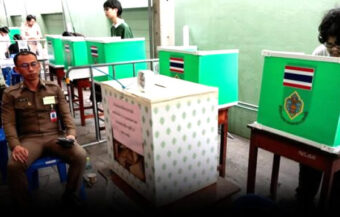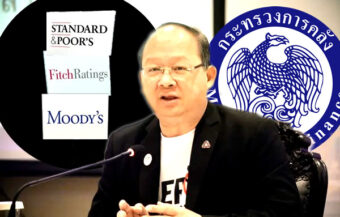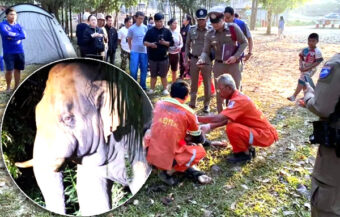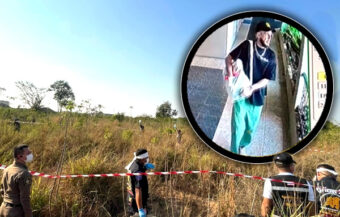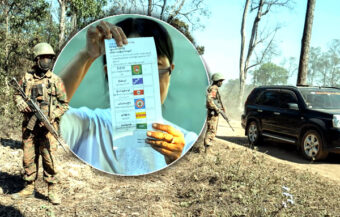Motorcycle thief arrested in Songkhla after snatching a tourist’s gold necklace at speed on a public bus as Thailand faces falling Asian visitors and rising fears over crime, highlighting economic hardship and social problems fueling petty theft across the south.
Thailand is facing a crisis of confidence among Asian tourists as its reputation for safety takes a hit. Northeast Asian arrivals are down 25% this year, while visitors from ASEAN, including Malaysia, are also falling. On Wednesday, Hat Yai police in Songkhla, a top destination for Malaysian travellers, arrested a 25-year-old man who turned to daylight theft out of desperation. On August 9, he brazenly snatched a gold necklace from a Malaysian tourist riding a public bus in the southern city. The thief later told police he had no money for food or daily necessities, highlighting deeper social and economic struggles fueling crime.

This week, the Tourism Authority of Thailand (TAT) reported alarming declines in the country’s foreign tourism sector. According to Rung Kanjanaviroj, an executive director at TAT, arrivals from Northeast Asia have fallen by 25%. Meanwhile, visitors from ASEAN countries are down by 8%, reflecting challenges across Thailand’s traditionally strong regional markets. Furthermore, even the Malaysian market, which showed significant promise last year and earlier this year, has begun to slow sharply.
Indeed, the only positive trends have come from long-haul travel. Arrivals from the Americas have increased by 8% this year, while European tourists surged by 15%.
However, officials warn that growth in these markets cannot fully offset losses in neighbouring regions. Consequently, tourism authorities are under pressure to address both declining arrivals and increasing negative perceptions.
Thailand faces sharp declines in Asian visitors despite moderate growth from Europe and Americas
A recent incident in southern Thailand illustrates why the country is losing ground in the eyes of travellers. On August 9, a young male thief snatched a gold necklace from a Malaysian tourist riding a bus in Hat Yai.
The assailant fled immediately on a motorcycle, leaving witnesses shocked and authorities concerned. Significantly, the crime occurred at a busy traffic light intersection on Thung Sao Road, a location once considered safe for tourists. The thief perpetrated the act while travelling on his motorbike.
Hat Yai police quickly launched a detailed investigation. Pol. Col. Thammarat Phetnongchum, Superintendent of Hat Yai Police Station, and his deputies, Pol. Lt. Col. Anuwat Ritthichai, Pol. Lt. Col. Suraphat Atsa-ard, and Pol. Lt. Col. Aphirak Chayaphan, coordinated the operation. Moreover, officers from Investigation Operation 3 traced CCTV footage and gathered eyewitness accounts along the suspect’s escape route. As a result, investigators identified the assailant as 25-year-old Sakrin, also known as Ko.
Hat Yai police track and identify thief who snatched a tourist’s necklace and fled by motorcycle
Authorities discovered Sakrin had fled to his mother’s home in Thung Wa District, Satun Province. Consequently, the investigation team travelled to Satun and apprehended him immediately as he exited the bathroom after showering.
He was then brought to Hat Yai Police Station for questioning. During interrogation, Sakrin admitted that he had been unemployed for a month and lacked money for food, transportation, and housing.
Furthermore, he confessed to selling the stolen gold necklace for over ฿20,000, using the money to pay for his car and house. He insisted he had not used the funds for gambling and had deceived his family by claiming he had found the necklace.
This incident highlights the deep social and economic problems facing southern Thailand. Many residents at the bottom of the economic ladder are struggling desperately. In addition, drugs and substance abuse continue to ravage communities, creating fertile ground for petty crime. Consequently, policymakers are confronted with the challenge of addressing poverty, addiction, and the safety of both residents and tourists.
Southern Thailand’s social and economic struggles are driving petty crime and threatening tourism safety
Tourism experts warn that incidents like the Hat Yai theft have broader implications. Petty crimes, even when isolated, can significantly undermine tourist confidence. Hat Yai, once a major destination for Malaysian visitors, now risks losing its reputation as a safe and accessible city. Furthermore, declining confidence in local security directly impacts hotels, restaurants, and businesses dependent on steady tourist traffic.
Moreover, law enforcement officials emphasise the effectiveness of modern investigative techniques. In this case, CCTV footage, witness accounts, and coordinated operations led to a rapid arrest.
Therefore, authorities argue that proactive policing and rapid response are essential to protecting tourists and deterring crime. At the same time, they stress the importance of community cooperation in reporting suspicious behaviour.
Economists also warn that ongoing economic hardship may worsen crime if left unaddressed. Targeted programs offering employment opportunities, food support, and addiction rehabilitation are critical. Without intervention, isolated crimes may become routine, threatening Thailand’s hard-earned reputation for security and law enforcement.
Tourism resilience depends on safety perceptions and addressing crime alongside economic hardship
Despite these challenges, Thailand’s tourism sector still shows resilience. Growth from Europe and the Americas offers a partial buffer against regional declines. Nevertheless, authorities caution that safety perceptions, rather than raw numbers alone, will dictate the country’s ability to sustain long-term tourism growth.
The Hat Yai incident, therefore, serves as a stark reminder that security remains a crucial factor for the tourism industry. It demonstrates how quickly a single crime can damage Thailand’s international image.
Consequently, policymakers, law enforcement, and local communities must act in tandem to maintain public confidence. Only by addressing both economic hardship and crime can Thailand protect its reputation and future tourism revenues.
Authorities pursue justice while tourism officials seek to restore Thailand’s safe and welcoming image.
Authorities confirmed that Sakrin has been formally handed over to investigators for further legal proceedings. Police continue to emphasise that justice will be pursued rigorously. Meanwhile, TAT officials are examining ways to reassure tourists and strengthen security measures nationwide. In the long term, the focus will remain on restoring Thailand’s image as a safe and welcoming destination.
Thailand’s once mighty tourism industry is failing but now faces further damage from overvalued baht
Bus driver arrested for pilfering a Romanian tourist’s account as Thai tourism is hit by rising scam reports
Tourism Ministry should hold its nerve and pursue long-haul markets with higher visitor spends strategy
Ultimately, the combination of declining regional arrivals, petty crimes, and economic hardship presents a serious challenge. Nevertheless, officials remain committed to addressing these issues proactively. By focusing on both enforcement and social support, Thailand hopes to prevent further incidents and sustain its global tourism appeal.
Join the Thai News forum, follow Thai Examiner on Facebook here
Receive all our stories as they come out on Telegram here
Follow Thai Examiner here
Further reading:
Thailand’s once mighty tourism industry is failing but now faces further damage from overvalued baht
Rate cut anticipated as outgoing Bank of Thailand governor attends last Monetary Policy Committee
Last minute tweaks in Bangkok as deal is finalised with U.S. However, Thailand may not match Vietnam


